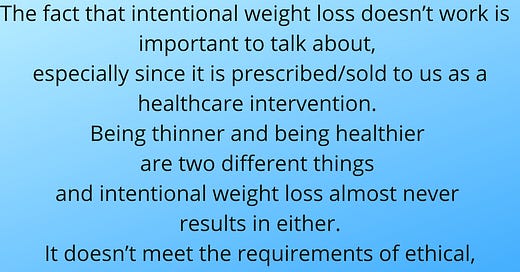This is the Weight and Healthcare newsletter! If you like what you are reading, please consider subscribing and/or sharing!
The truth is that in addition to intentional weight loss resulting in regain to baseline about 95% of the time, research shows that up to 66% of the time intentional weight loss results in people regaining more than they temporarily lost. The way we discuss that is tricky.
First, to be clear “intentional weight loss” in this piece includes any attempt to decrease body size by altering food intake and/or movement. This may be called a diet, a lifestyle change, a health plan or something else. It turns out that one of the many negative impacts of giving a body less food than it needs to survive in the hopes that it will eat itself and become smaller, is that the body’s famine defenses kick in and alter it to become a weight-gaining, weight-maintaining machine.
So, would the victims of diet culture have been smaller without a history of dieting? Maybe. What’s important is that a smaller body is not a better body – bodies come in lots of sizes for lots of reasons, and people of all sizes are fully worthy of respect.
And that’s the issue with this argument. Though it’s true that dieting is likely to leave people fatter than they were when they started, using that as an argument against dieting is inherently fatphobic since its core premise is still that we want to avoid people becoming fat/fatter.
That said, we live in a fatphobic society and dieting and the diet culture it creates have real negative consequences to physical and mental health, and so this argument can also be considered a harm reduction strategy. It can be seen as a drop of fatphbobia in the fatphobia bucket, but if it keeps a parent from putting their child on a diet for example, someone might decide that it’s worth it in a cost-benefit analysis.
If that is the direction that someone is moving, there are things that can be done to improve this argument in the way that it is framed.
After I explain statistics around dieting and weight gain I’ll often say something like “so even if you believe that fat people would be healthier if we were thinner – and I don’t agree – dieting is still the worst possible advice you could give us.”
The truth is that there are actual health risks to dieting which I think are important to point out, saying something like “It’s not that weight gain is, in and of itself, the problem. The problem is that dieting changes a person’s physical and mental response to food and movement and can lead to health issues from the many issues associated with weight cycling to perpetuating eating disorders.”
I most often use this argument when I’m speaking to healthcare providers about whether or not dieting meets the requirements of ethical, evidence-based medicine (spoiler alert – it doesn’t.) When I make this point, I try to always counter any fatphobia inherent in the argument by saying something like – “there’s nothing wrong with people being fat or getting fatter, but there is something wrong with giving a supposed medical intervention that has the opposite of the intended effect the majority of the time.” Or “A larger body is not a medical problem to be solved, but as long as HCPs are trying to treat weight loss as if it’s a medical intervention, then we have to talk about whether or not it meets the basic requirements of ethical, evidence-based medicine.”
The fact that intentional weight loss doesn’t work – especially since it is prescribed/sold to us as a healthcare intervention. Still, being thinner and being healthier are two different things and intentional weight loss almost never results in either, which means that it doesn’t meet the requirements of ethical, evidence-based medicine whether it makes people fatter or not.
Did you find this post helpful? You can subscribe for free to get future posts delivered direct to your inbox, or choose a paid subscription to support the newsletter and get special benefits! Click the Subscribe button below for details:
More research and resources:
https://haeshealthsheets.com/resources/
*Note on language: I use “fat” as a neutral descriptor as used by the fat activist community, I use “ob*se” and “overw*ight” to acknowledge that these are terms that were created to medicalize and pathologize fat bodies, with roots in racism and specifically anti-Blackness. Please read Sabrina Strings Fearing the Black Body – the Racial Origins of Fat Phobia and Da’Shaun Harrison Belly of the Beast: The Politics of Anti-Fatness as Anti-Blackness for more on this.




A very fine post, as usual. Shared! PS - It is scary to me that even when parents know about and accept that there are risks inherent in encouraging their fat kids to lose weight, and they refrain from doing so, a bigoted pediatrician can override that and shame the fat kid who is their patient, even without the parent knowing. It happened to my daughter, and it gave her an eating disorder and contributed to her low self esteem all of her life. She discussed it with me 20 years after her horrible pediatrician experience. Her mother and I never knew.